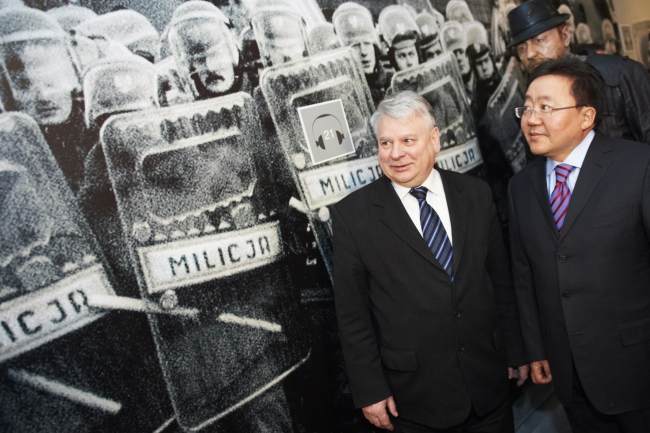
Speaker of the Senate Bogdan Borusewicz and President Tsakhiagiin Elbegdorj at the "Paths to Freedom" exhibition in Gdansk: photo - PAP/Adam Warsawa
“I'm very glad to be standing in such an important place, where the history of the 20th century was created,” President Tsakhiagiin Elbegdorj said at the Monument to Fallen Shipyard Workers in the Baltic city, as cited by the Polish Press Agency (PAP).
“It is a great honour. The Mongolian people very much respect the Polish nation, which brought democracy to the whole world,” he reflected
President Tsakhiagiin Elbegdorj was himself a key player in Mongolia's peaceful revolution of 1990, serving twice as prime minister, and ultimately becoming the first Mongolian head of state in decades who had never been a member of the communist party.
“You built democracy in Europe, and we in Asia. It was a difficult task for a country lying between the Soviet Union and China,” he said.
The Mongolian president was accompanied by Speaker of the Senate, Bogdan Borusewicz, who was a leading member of Solidarity during the 1980s. Borusewicz co-organised the seminal strike at Gdansk shipyard in August 1980, paving the way for the creation of the pro-democracy trade union.
While in Gdansk, the Speaker of the Senate also guided the Mongolian president around the exhibition “Paths to Freedom” of the European Solidarity Centre (pictured above).
Economic ties
President Tsakhiagiin Elbegdorj's trip to Poland, which began on Monday, is primarily connected with strengthening economic ties between the two countries.
The president, whose delegation includes 60 prominent Mongolian businessmen and industry figures, took part in an economic forum in Warsaw on Monday, besides meeting President Bronislaw Komorowski and Prime Minister Donald Tusk.
Mineral-rich Mongolia is currently in the throes of an economic boom, largely thanks to its flourishing mining industry.
It's economy grew by 17 percent in 2011, drawing on its extensive resources of copper, coal and gold. Growth estimates for last year and 2013 are similar.
The Central Asian country has a population of 2.8 million, but with its flowing steppes, populated by nomadic herders, it has one of the lowest population densities in the world.
Some 94 percent of the inhabitants are Buddhist, and 6 percent Muslim, the latter principally in the south-west. (nh)